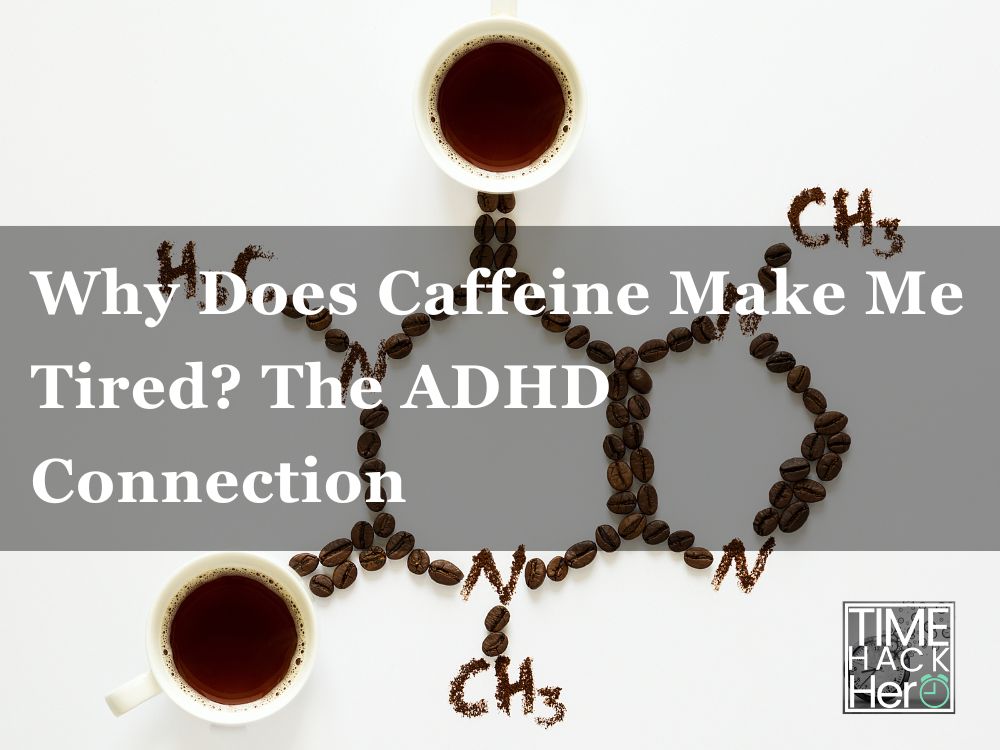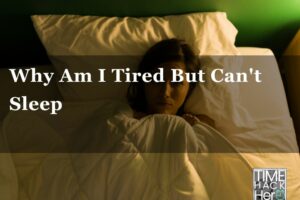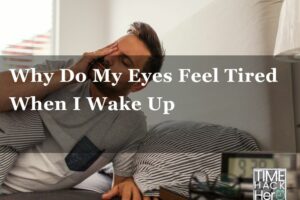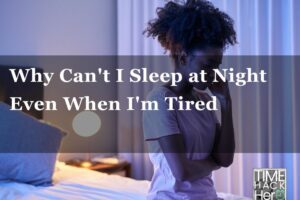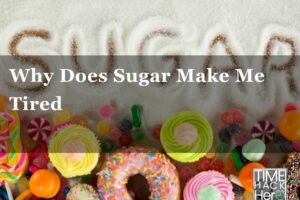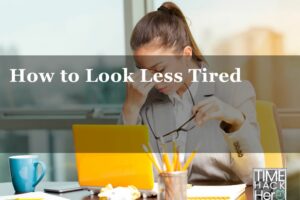For most people, drinking a cup of coffee provides a jolt of energy and heightened focus. But some individuals with Attention Deficit/Hyperactivity Disorder (ADHD) report feeling tired after caffeine instead of stimulated. This paradoxical reaction can be perplexing and frustrating. If you have ADHD and coffee makes you drowsy, you’re not alone. Let’s examine why this reverse response happens, effects of caffeine fatigue, and tips to manage energy levels.
Table of Contents
Is This Normal for ADHD?
Up to 30% of people with ADHD say caffeine causes them to feel sleepy and sedated rather than alert. So experiencing this reaction is relatively common among the ADHD population, though not universal. Caffeine is a stimulant that normally blocks adenosine, the neurotransmitter that signals tiredness. But for those with ADHD, caffeine may overly suppress adenosine, leading to a “rebound effect” and drowsiness. The exact mechanisms aren’t fully understood, but genetics likely play a role.
Why Does Caffeine Make Me Tired? The ADHD Connection
It may seem paradoxical that drinking caffeine makes you feel drowsy instead of energized. However, this apparent reverse reaction can occur in people with Attention Deficit Hyperactivity Disorder (ADHD). There are several mechanisms behind caffeine-induced fatigue in ADHD.
Caffeine Withdrawal
People with ADHD often develop a dependence on caffeine for its temporarily stimulating effects. However, caffeine withdrawal can then lead to rebounds of fatigue:
- Tolerance – increasing caffeine intake is needed to get the same energizing boost as tolerance builds.
- Withdrawal – abstaining from habitual caffeine intake leads to headaches, brain fog, and increased sleepiness as the body adjusts.
- Withdrawal can set in within 12-24 hours of last caffeine intake. Weaning slowly can minimize withdrawal fatigue in dependent coffee drinkers.
Adenosine Receptor Changes
Caffeine blocks adenosine receptors in the brain, which normally promote sleepiness. Chronic caffeine use alters these receptors in complex ways:
- Initially, blocking adenosine provides alertness by inhibiting sleep pressure.
- But persistent caffeine exposure increases adenosine receptor density as the brain tries to overcome the adenosine blockade.
- The net effect is needing even more caffeine to counteract the rising adenosine signaling that triggers drowsiness.
- Adenosine rebound after caffeine wears off can make people with ADHD even more tired than before drinking it.
Stimulant Tolerance
Those with ADHD frequently use stimulant medications like Adderall or Ritalin to boost concentration and focus.
However, chronic stimulant use reduces their efficacy over time:
- Dopaminergic stimulant medications provoke adaptations like downregulation of dopamine receptors.
- This results in behavioral tolerance where the same dose provides less benefit.
- Higher doses are then needed to achieve the same effects, eventually reaching an efficacy plateau.
- Coming off caffeinated drinks then impairs dopamine signaling, as caffeine weakly enhances dopamine activity similar to stronger stimulants.
Impaired Sleep Quality
While providing daytime wakefulness, caffeine also interferes with getting restorative sleep:
- Caffeine has a long 5-10 hour half-life, lingering to delay sleep onset at night.
- Its metabolites continue to have alerting effects for 24 hours, also fragmenting sleep through the night.
- This inadequate sleep leaves those with ADHD more functionally impaired during the day.
- Their underlying sleep dysfunction exacerbates caffeine’s sleep disruption.
Why Caffeine Disrupts Restful Sleep in ADHD
| Mechanism | Effect | Result |
|---|---|---|
| Long half-life | Persists in body for 5-10 hours | Delays falling asleep at night |
| Alerting metabolites | Present for up to 24 hours | Light, fragmented sleep |
| Impaired sleep architecture | Less time in restorative REM and deep sleep | Non-restorative sleep |
| Exacerbates sleep deficits | ADHD is linked to underlying sleep disturbances | Causes greater daytime impairment |
Tips to Avoid Caffeine Fatigue
People with ADHD who experience paradoxical tiredness from caffeine can take steps to reduce this phenomenon:
Limit caffeine intake
Restrict caffeine to 1-2 times per week max to lower tolerance.
Opt for weaker drinks
Choose green tea or matcha which have less caffeine than coffee.
Stop consumption earlier
Have caffeinated drinks before 2 pm to prevent disrupting circadian rhythms.
Stay hydrated
Drink extra water to prevent dehydration from caffeine.
Eat before caffeine
Have protein and healthy fats to stabilize blood sugar response.
Take L-theanine
This amino acid smoothes the “caffeine crash” in some.
Use caffeine alternatives
Opt for guayusa, ginger, apple cider vinegar for energy.
Treat other factors
Manage anxiety, poor sleep habits, and vitamin deficiencies contributing to fatigue.
Exercise
Regular physical activity boosts alertness and mental clarity.
Check medications
Discuss potential interactions with doctor and adjust timing if needed.
See an ADHD specialist
Get personalized guidance to improve fatigue symptoms long-term.
Conclusion
It’s clear that for many people with ADHD, consuming caffeine has the unintended consequence of causing sleepiness and low energy rather than boosting alertness as it does in most. The reasons for this abnormal reaction are still being investigated but likely involve adenosine rebound, cortisol spikes, blood sugar changes and other effects. To avoid the negative impacts of caffeine fatigue like concentration struggles and depression, those with ADHD should limit caffeine, stay hydrated, exercise, address underlying issues, and consult specialists. While caffeine may not provide energy, other lifestyle strategies can help maintain wakefulness and productivity.
Frequently Asked Questions
Does caffeine affect children with ADHD differently?
Yes, children may be more sensitive to the effects of caffeine due to their still-developing brains and bodies. Caffeine toxicity can occur at lower doses in kids. Parents should be cautious about allowing caffeine, monitor effects closely, and limit to early in the day.
What drink has the least caffeine per ounce?
Green tea contains around 15-30mg of caffeine per 8 ounce cup, compared to 95mg in 8 ounces of coffee. Matcha green tea has more at around 70mg per 8 ounces. Herbal caffeine-free teas like chamomile and mint have no caffeine.
Can you develop a caffeine tolerance even by drinking it rarely?
Yes, tolerance to the effects of caffeine can build up over time even if consuming it infrequently, like 1-2 times per week. This tolerance likely underlies the abnormal fatigue response experienced by some with ADHD.
Does caffeine increase anxiety for those with ADHD?
Caffeine consumption can worsen feelings of anxiety in those with ADHD due to stimulant sensitivity and adrenal fatigue. Anxiety often causes restlessness and insomnia which further exacerbate fatigue. Avoiding excess caffeine may help lower anxiety levels.
Are caffeine pills a good alternative energy source?
No, caffeine pills are not recommended as an energy boosting alternative for those with ADHD and paradoxical fatigue. Pills contain concentrated caffeine and rapid absorption which can lead to jitters, insomnia, nausea, and energy crashes.

